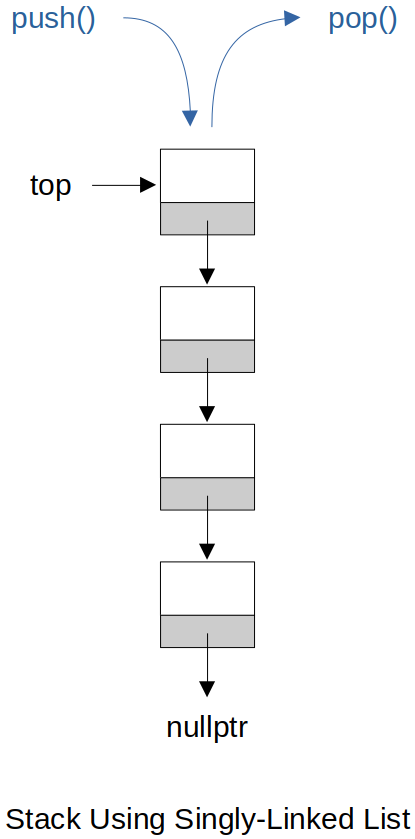Home | Projects | Notes > Data Structures & Algorithms > Stacks
Stacks
Introduction
A stack is a linear data structure that follows the Last In, First Out (LIFO) principle. Elements are added (push) and removed (pop) only from the top of the stack. It can be implemented using arrays, linked lists, or other containers, and is widely used in function call management, undo operations, and parsing expressions.

Pros:
Simple and Fast:
O(1)time forpushandpopoperations.Easy to Implement: Can be built using arrays or linked lists.
Useful in Algorithms: Backtracking, recursion, depth-first search (DFS), etc.
Memory-Efficient with Linked List: Grows dynamically without resizing.
Cons:
Limited Access: Only the top element is accessible; no random access.
Fixed Size (Array-Based): Requires resizing or limits capacity.
Not Ideal for Search or Arbitrary Removal: Inefficient for operations other than LIFO.
Compared to Queues:
Better: For backtracking, recursion, nested structure parsing.
Worse: When first-in elements must be accessed or preserved.
Implementation (C++)
Header (stack.hpp)
301
4class node5{6public:7 node(int val) : data(val), p_next(nullptr) {}8
9 int data;10 node *p_next;11};12
13class stack14{15public:16 stack();17 ~stack();18 void push(const int val);19 void pop();20 int top() const;21 bool empty() const;22 int size() const;23 void clear();24
25private:26 node *p_top;27 int cnt;28};29
30Source (stack.cpp)
691
4stack::stack()5 : p_top(nullptr), cnt(0)6{7 // Do nothing8}9
10stack::~stack()11{12 while (!empty())13 {14 pop();15 }16}17
18void stack::push(const int val)19{20 node *p_new = new node(val);21 p_new->p_next = p_top;22 p_top = p_new;23 ++cnt;24}25
26void stack::pop()27{28 if (empty())29 {30 throw std::runtime_error("Stack underflow");31 }32
33 node *p_del = p_top;34 p_top = p_top->p_next;35 delete p_del;36 --cnt;37}38
39int stack::top() const40{41 if (empty())42 {43 throw std::runtime_error("Stack is empty");44 }45
46 return p_top->data;47}48
49bool stack::empty() const50{51 return 0 == cnt;52}53
54int stack::size() const55{56 return cnt;57}58
59void stack::clear()60{61 while (nullptr != p_top)62 {63 node *p_del = p_top;64 p_top = p_top->p_next;65 delete p_del;66 }67
68 cnt = 0;69}Test Driver
221
4int main(int argc, char *argv[])5{6 stack s;7
8 s.push(1);9 s.push(2);10 s.push(3);11 s.push(4);12 s.push(5);13 14 std::cout << s.top() << std::endl; // 515 std::cout << s.size() << std::endl; // 516 std::cout << s.empty() << std::endl; // 017
18 s.clear();19 std::cout << s.size() << std::endl; // 020
21 return 0;22}415253040
Stack Using Singly-Linked List (C)
Interface
271
4
6typedef struct node7{8 int data;9 struct node *p_next;10} node;11
12typedef struct13{14 node *p_top;15 int cnt;16} stack;17
18// Public interface19void stack_init(stack *s);20void stack_push(stack *s, const int val);21void stack_pop(stack *s);22int stack_top(const stack *s);23bool stack_empty(const stack *s);24int stack_size(const stack *s);25void stack_clear(stack *s);26
27Implementation
681
5void stack_init(stack *s)6{7 s->p_top = NULL;8 s->cnt = 0;9}10
11void stack_push(stack *s, const int val)12{13 node *p_new = (node *)malloc(sizeof(node));14
15 if (!p_new)16 {17 fprintf(stderr, "Failed to allocate memory for new node\n"); 18 exit(EXIT_FAILURE);19 }20
21 p_new->data = val;22 p_new->p_next = s->p_top;23 s->p_top = p_new;24 s->cnt++;25}26
27void stack_pop(stack *s)28{29 if (stack_empty(s))30 {31 fprintf(stderr, "Stack underflow\n");32 exit(EXIT_FAILURE);33 }34
35 node *p_del = s->p_top;36 s->p_top = s->p_top->p_next;37 free(p_del);38 s->cnt--;39}40
41int stack_top(const stack *s)42{43 if (stack_empty(s))44 {45 fprintf(stderr, "Stack is empty\n");46 exit(EXIT_FAILURE);47 }48
49 return s->p_top->data;50}51
52bool stack_empty(const stack *s)53{54 return 0 == s->cnt;55}56
57int stack_size(const stack *s)58{59 return s->cnt;60}61
62void stack_clear(stack *s)63{64 while (s->p_top)65 {66 stack_pop(s);67 }68}Test Driver
715203544546170